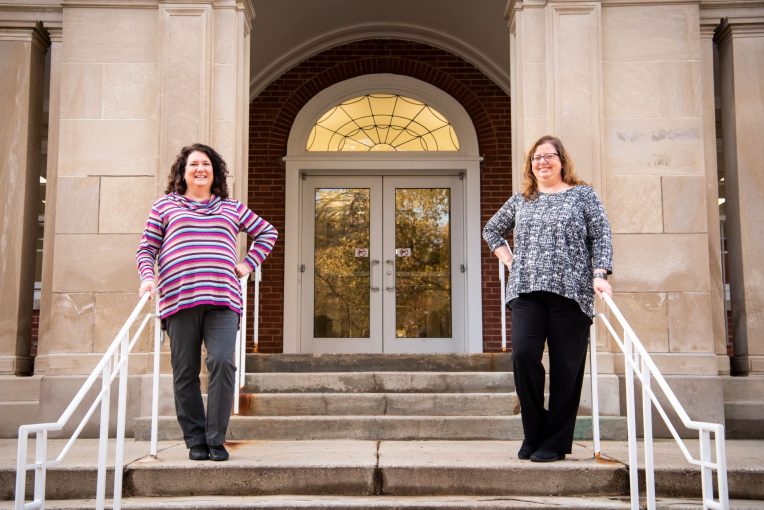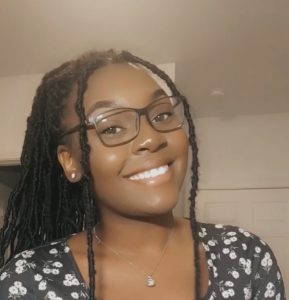When Amaya Sessom found herself in an academic struggle during her freshman year, the easiest path would have been to ignore the seriousness of the situation and quit. But, instead of quitting, she asked for help.
A pair of programs created here at Illinois State University—Project Success and Project Rebound—are designed to support students facing what they may see as the end of their academic world. Rather than the end, facing up to the problem, no matter the cause, can mean a fresh start.
Michelle Schuline ’03 is a specialist in Illinois State’s University College where she oversees both programs. Schuline, who has been at the University for 24 years, gets a lot of personal satisfaction from helping students and always tries to make a personal connection. She also likes to see her students finish on a high note.
“Every year I try to participate as a volunteer for commencement so that I can see them make it all the way,” she said.
Schuline said Project Success and Project Rebound are meant to be proactive programs designed to help students during their probation semester.
“We make sure that students are aware of the various resources that the University offers, that they have peer support, a go-to person to ask questions of along with their academic advisor, and we help them be accountable,” Schuline said.
Project Success is for first-time probation students. The requirements, according to Schuline, include attending a seminar at the beginning of the semester and another around midterm time; meeting with their academic advisor; and attending a Julia N. Visor Academic Center workshop.
Project Rebound is designed for students who have experienced academic dismissal and are now reinstated. Building on what was learned in Project Success, all students who have been reinstated to the University must participate in Project Rebound. Requirements include attending an orientation; attending small-group, biweekly sessions with a facilitator and other students; completing a brief activity on ReggieNet; meeting with their academic advisor; and attending a one-on-one session with their facilitator.
Project Success and Project Rebound were the ideas of Amy Roser ’95, M.S. ’02, program coordinator at University College. Roser wanted to create a safety net of support for students who might be feeling alone and frightened and doubting their future.
“Students working toward academic recovery face so many challenges,” Roser said. “My hope is that through Project Success and Project Rebound, students will see that others believe in them and, importantly, that they don’t lose sight of a belief in themselves.”
“Students working toward academic recovery face so many challenges. My hope is that through Project Success and Project Rebound, students will see that others believe in them and, importantly, that they don’t lose sight of a belief in themselves.”
Amy Roser
Sessom, a first-generation college student, is a good example of how to meet this daunting challenge.
“Amaya was in Project Success in spring 2020 and then Project Rebound in fall 2020,” Schuline said. “She completed both successfully, and she’s flourished since.”
Sessom arrived at Illinois State from Chicago in 2019 as a freshman. She had some challenges at home, some of which were financial, and she was on her own for the first time.
“There was a lot of paperwork to complete for financial aid, and with family issues, it all became a major distraction,” Sessom said. “And, then spring semester hit, and we went online. That added to the challenge.”
Sessom said the weekly Zoom meetings with Schuline were what allowed her to stay in school. She credits Schuline and those online meetings with providing the encouragement she needed that she wasn’t getting at home.
“Michelle is invested in her students and really listens to them,” Sessom said. “She was able to keep me going mentally and emotionally. She also helped me find a counselor through Student Counseling Services. It was really hard on my mental health. Michelle was pretty perfect.”
Sessom is currently a sophomore accounting major, but she’s on track to move into her junior year in the spring. She’s not only setting a good example for other Illinois State students, but she’s also showing her younger siblings the way.
“I’m the oldest of 13, all girls, and I will encourage them all to go to college,” Sessom said.
Her advice for anyone in a similar situation academically is to reach out and take advantage of all the opportunities that the University provides.
“That could be professors, your advisor, or staff members,” she said. “Everyone that I have encountered will help you. ISU provides so many resources. It might even be that you’re more comfortable with your financial aid advisor; well, they will help get you in touch with the people who can help you.”
Like most people, Sessom still has things in her life that test her, but now she has more experience—thanks in part to Project Success and Project Rebound—that should help her in the future. She said she feels better equipped to cope and manage things that previously might have derailed her. The connection with Schuline has continued well after Sessom got herself to a better place academically and emotionally.
“I still keep in touch with Michelle,” Sessom said. “She’s encouraging me to be a peer mentor through University College’s Julia N. Visor Academic Center, so I’ll be looking to do that next year during the summer or fall. I’ll also be a TA for my accounting class during the spring semester.”
While Schuline connected Sessom with resources that helped her find success, she said the turnaround was due to Sessom’s hard work. The two still meet every other week during the semester to make sure Sessom is doing OK.
“Amaya was one of the few students who took me up on my offer to meet more frequently,” Schuline said. “I’m so proud of her and am glad that I have been part of her academic journey at ISU.”
For Sessom, the experience has paid immediate and lasting dividends.
“I believe it’s made me more confident in myself,” she said. “It let me know: ‘You can do this.’”


